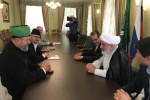Leader of the Center for Dialogue of Religions and Cultures of the Islamic Culture and Communication Organization in Iran completes his visit to Moscow
From July 14 to 18, 2019, Hojjat-ul-Islam Muhammad Mahdi Tashiri, leader of the Interreligious Dialogue Center of the Islamic Culture and Communication Organization in Iran, was on a visit to Moscow. During his meetings, Dr. M. Tashiri was accompanied by K. Soleimani, head of the Iranian Cultural Representation in Russia, and interpreter Idris Idrisov. The main purpose of Dr. Tashiri’s visit to Russia was preparation for the 12th meeting of the joint Russian-Iranian commission for dialogue ‘Orthodoxy-Islam’.
On July 15 2019, Dr. Tashiri met with Metropolitan Hilarion of Volokolamsk, head of the Moscow Patriarchate department for external church relations (DECR), at the DECR. From the DECR side there were also Archimandrite Philaret (Bulekov), DECR vice-chairman; and Rev. Dimitry Safonov, DECR secretary for interreligious relations. It was agreed to hold the 12th meeting of the joint Russian-Iranian Commission for Dialogue ‘Orthodoxy-Islam’ in May 2020 in Russia. In conclusion of the talk the sides exchanged tokens of the meeting.
Later that day, Mr. Tashiri was taken on a tour of the Moscow cathedral mosque. The Iranian guests were accompanied by Mr. A. Ignatenko, deputy head of the Moscow Government’s directorate for relations with religious organizations, and Mr. O. Blyudov, secretary of the Committee of Patrons of the Interreligious Council in Russia.
On July 16, Dr. Tashiri visited the Ss Cyril and Methodius Institute of Post-Graduate Studies (CMI). The Iranian delegation also included Mr. K. Soleimani, leader of the Iranian cultural representation in Russia, and interpreter Idris Idrisov.
From the CMI there were Hieromonk Pavel (Cherkasov), CMI pro-rector for training; Rev. Dimitry Safonov, DECR secretary for interreligious relations and secretary of the CMI academic council; Deacon Dmitry Serov, head of the CMI international department; and S. Melnik, DECR secretariat for interreligious relations.
Hieromonk Pavel explained the history, structure and educational work of the CMI as an education institution that set itself as its goal the training of highly qualified church diplomats and academics. Deacon D. Serov reported on the international programs of the students’ exchange. Rev. D. Safonov expounded the course he reads on international relations in which MA course students are introduced in detail in the work of the joint commission of the Russian Orthodox Church and Iran ‘Orthodoxy-Islam’, which has functioned since 1997. Dr Tashiri shared his experience of religious education in Iran pointing that his country can rightly be proud of the religious diversity and the respect shown for believers of various traditions. During the talk, the sides discussed prospects for the development of interreligious interaction in the academic sphere.
After their visit to the Russian Orthodox Church’s educational institution, the Iranian delegation went to the residence of the Muslim Assembly of Russia. Participating in the meeting there were the Mufti Bata Kifah of the Volgograd Region; I. Gainutdinov, deputy of Mufti A Krganov; Chancellor D. Mustafin; M. Mirsayapov, head of the international department; and O. Blyudov, secretary of the Committee of Patrons of the Interreligious Council in Russia. They discussed the organization of the life of Muslim communities and the importance of interreligious dialogue in today’s world. A grand dinner was given in honour of the Iranian delegation.
In the evening of the same day, Dr. Tashiri visited the Novospassky Monastery. With a blessing of its abbot, Bishop Dionisy of Voskresensk, the high guest was welcomed by the bishop’s personal secretary Deacon Timofei Schipachev and the leader of the Southeast vicariate in Moscow A. Sirota. During the tour of the monastery, the Iranian delegation were introduced to the history of the old Patriarchal cloister with its close relations with the Romanov Dynasty. The guests visited the Cathedral of the Transfiguration, the Romanov boyars’ burial-vault and the church archaeological museum.
On July 17, Hojjat-ul-Islam M. Tashiri met at the RF Public Chamber with the head of the Commission for Harmonizing Inter-ethnic and Interreligious Relations, I. Diskin. Present at the meeting were representatives of both the Russian Orthodox Church and Islamic religious organizations. Mr. Diskin explained the work of the RF Public Chamber and his commission’s principal aim to overcome interethnic and interreligious conflicts and to combat pseudo-religious extremism. Dr. Tashiri explained the structure of the Islamic Culture and Communication Organization and the work its constituent Center for Interreligious Dialogue. The sides stated the desirability of an exchange of experience and of a more active cooperation in various areas including the assertion of traditional moral values as a condition for state and society stability. The meeting also discussed cooperation between the Public Chamber in Russia and public organizations in Iran with the aim to broaden interaction of the civic societies in the two countries and contacts in the social sphere.
In the evening of the same day, a meeting was held at the Moscow representation of Tatarstan between the co-chairman of the joint Russian-Iranian commission ‘Orthodoxy-Islam’ Metropolitan Feofan of Kazan and Tatarstan and Dr. Tashiri. Participating in it were also Ravil Ahmetshin, deputy prime minister of the Republic of Tatarstan, and Kahranam Soleimani, head of the Cultural Representation under the Embassy of the Islamic Republic of Iran in the Russian Federation. From the DECR, there was Rev. Dmitry Safonov.
The participants discussed common aims and tasks facing both Orthodox Christians and Muslims today, and problems involved in the preservation of inter-ethnic peace and accord. Metropolitan Feofan pointed to the important role played by religion and unity in building relations in modern society.
In his turn, Mohammad Mehdi Tashiri spoke about traditional Islam, noting that unity among nations was an answer to complex challenges of the generation. In conclusion of the meeting, the head of the Metropolis of Tatarstan invited the Iranian delegation to visit the Republic of Tatarstan for a more detailed introduction to the region.
DECR Communication Service






























